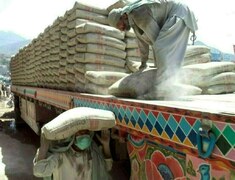ISLAMABAD: All Pakistan Textile Mills Association (APTMA) has approached caretaker Finance Minister Dr Shamshad Akhtar for availability of electricity at wheeling charges of 1-1.4 cents/kWh and B2B contracts.
In a letter to caretaker Finance Minister, APTMA referred to a report carried by Business Recorder on the formation of a special panel headed by her to deliberate on the issue of UoSC/wheeling charges for B2B power contracts, and appreciated the development of an independent and judicious assessment of the UoSC/Wheeling Charges while claiming that the export sector has been banging its head against the wall at all relevant forums for quite some time for a rational wheeling charge for B2B power contracts.
APTMA maintained that given the prevailing economic situation, a sustained increase in exports must be given top priority across all sectors of the government and the economy. In view of both immediate and medium-term threats to export competitiveness posed by prohibitively uncompetitive power tariffs and emerging regulations on green energy in key export destinations, B2B power contracts under the Competitive Trading Bilateral Contracts Market (CTBCM) with a wheeling charge of 1-1.5 cents/kWh, excluding cross subsidies and stranded costs, are absolutely critical for the recovery and sustained growth of the textiles and apparel export industry.
Higher tariffs cause power consumption decline: APTMA
An unrealistic and absurd wheeling charge of around 9.6 cents/kWh has been proposed by the CPPA-G/Discos which defeats the entire purpose of the CTBCM/market liberalization and underscores the intention of the power bureaucracy in stalling any meaningful reforms. The absurdity of the proposed wheeling charge is further emphasized by the fact that it is significantly higher than the full power tariff for export-oriented consumers in regional economies like Bangladesh (8.6 cent/s kWh, India (6 cents/kWh and Vietnam (7.2 cents/ kWh.
APTMA further contended that when the export sector was provided with regionally competitive energy tariffs of 9 cents/kWh during 2020-22, Pakistan’s textiles and apparel exports increased by 54% in only two years. However, following the withdrawal of regionally competitive energy tariffs amid a larger macroeconomic crisis and power tariff rebasing earlier this year, power tariffs for export-oriented industrial consumers increased from 9 cents/kWh to over 14 cents/kWh, including various economic inefficiencies like stranded costs and cross subsidies to nonproductive sectors of the economy.
The current B3 and B4 industrial tariff of approximately 14 cents/kWh is almost twice the average faced by competing firms in regional economies and renders the textiles and apparel sector’s exports uncompetitive in international markets. At 9 cents/kWh, energy costs account for 12-18% of total input costs across the textiles and apparel value chain. An analysis, based on actual data of publicly listed firms, indicates that when power tariffs increase from 9 cents/kWh to 14 cents/kWh, average firm profitability decreases from around 8.61% to only 1%. In a high-volume-low-margin business like textiles and apparel, such a drop in profitability causes severe loss of competitiveness and a sharp reduction in the volume and value of exports.
The Association further argued that as it stands, textiles and apparel exports for 11 months remain down by 15% compared to the same period last year and de-industrialization is in full swing across the economy and especially in Punjab as indicated by the Pakistan Institute for Development Economics. In October 2023, for instance, power consumption of APTMA member firms declined by 49% on the LESCO network and by 36% on the MEPCO network, year-on-year.
According to APTMA, NEPRA’s capacity to independently determine judicious wheeling charges has been severely curtailed by the unilateral introduction of Rule 5 in the Eligibility Criteria (Electric Power Supplier Licence) Rules, 2023 through which the Power Division now dictates the components and quantum of charges to be levied in power tariffs.
“We reiterate the utmost importance of allowing B2B power contracts with the Use of system charges/wheeling charge to export growth in the form of prohibitive energy tariffs that render exports uncompetitive, as well medium-term challenges such as the EU’s C-BAM that will lead to a complete collapse of the export sector in transition to green energy and net-zero emissions in export production is not facilitated immediately,” said Shahid Sattar, Executive Director APTMA.
Copyright Business Recorder, 2023























Comments
Comments are closed.